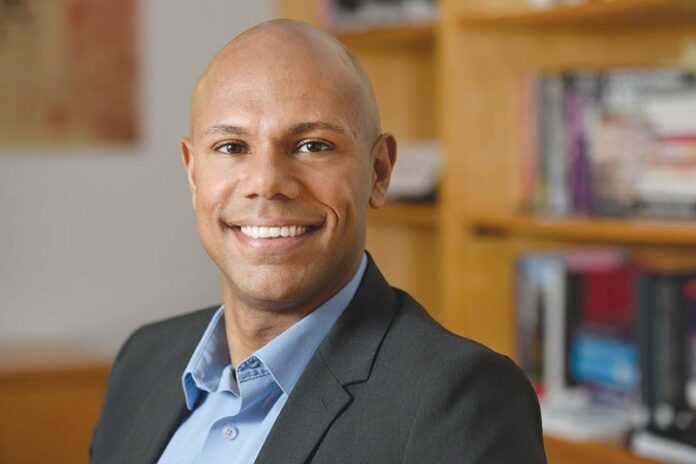I‘m sitting outside an office at Stanford University, waiting to speak with a man who shares a similar path to Barack Obama, law fellow Mugambi Jouet.
Much like the former president, Jouet spent a good deal of his youth in another country—Obama in Indonesia, Jouet in France—which provided a cultural immersion that deepened and broadened both men’s perspectives on America.
Jouet began working on his new book, Exceptional America: What Divides Americans from the World and from Each Other well before Trump’s election win, which the professor admits he didn’t foresee. Trump’s victory has amplified the book’s themes and timeliness.
Jouet’s book painstakingly attempts to answer a question on the minds of people from Pasadena to Paris: WTF is happening to America?
“Most people tend to think American exceptionalism means a faith in American superiority, the notion that the country is exceptional in the sense of ‘wonderful’ or ‘outstanding’ or ‘phenomenal,'” Jouet says.
“But historically, American exceptionalism has mainly meant something else, which is that America is an exception objectively and descriptively, especially when compared to other Western democracies.”
His book examines how the growing dark side of exceptionalism has driven the polarization of U.S. politics, its effect on other parts of the globe and the changing meaning of the phrase.
“It was not before the Obama era that the term was redefined as a political weapon to impugn Obama’s patriotism,” Jouet says.
“People began talking about American exceptionalism at the same time as there was this debate, that still exists today, about the great divide within American society. But people did not connect the two together as I did in my book, arguing that the great polarization of modern America is a dimension of American exceptionalism, in that it’s very peculiar by international standards.”
Trump, a vocal force behind the birther movement that dogged Obama, played off the same page in last year’s election by promising to “make America great again.” That’s a very different take on the original meaning of American exceptionalism.
The term didn’t really come into use at all until leader of the American Communist Party USA Jay Lovestone began using it in the 1920s. He employed it as an excuse to explain to Joseph Stalin why the “so-called universal laws of Marxism” weren’t taking hold in the United States.
Academics went on to use the term to describe how U.S. history, culture and society make the country so different from other advanced nations—from the legal and political systems to economics, race relations and religious attitudes, Jouet says.
He traces Trump’s rise to the full flowering of Christian fundamentalism, anti-intellectualism, radical anti-governmentalism and racial resentment—themes that were not new, but until more recently were much less prominent.
The more celebrated aspects
of this nation’s exceptionalism, adopted by other democracies—freedom of religion, women’s rights and demographic diversity, social welfare—started to be dismantled in the United States around the time of the Reagan years, Jouet says.
The result is the rise of a strengthened nativism, nationalism, anti-immigrant sentiment, distrust of institutions, lack of empathy for the poor, disdain for education and the rise of alternative facts.
“America is an exception,” says Jouet, “because Americans are clashing over a broad range of issues that are either not controversial or are much less controversial in the modern Western world, such as whether people should have a basic right to modern healthcare, whether special interests should be allowed to spend unlimited money on political campaigns and on lobbying, whether climate change is a hoax or a scientific reality, whether women should have a right to abortion, whether contraception should be covered by people’s health insurance, whether creationism or evolution should be taught in public schools, whether people should have an unbridled right to bear arms, whether to have the death penalty, whether to have mass incarceration, whether it’s appropriate to introduce torture into Western civilization as a means of fighting terrorism.”
The plus side of exceptionalism is that American social problems “partly have roots in admirable aspects of American society, such as its tradition of religious liberty and egalitarianism, as well as the country’s remarkable demographic diversity,” Jouet says. “But these positive aspects of American exceptionalism can manifest themselves in inspiring, contradictory and self-destructive ways.”









